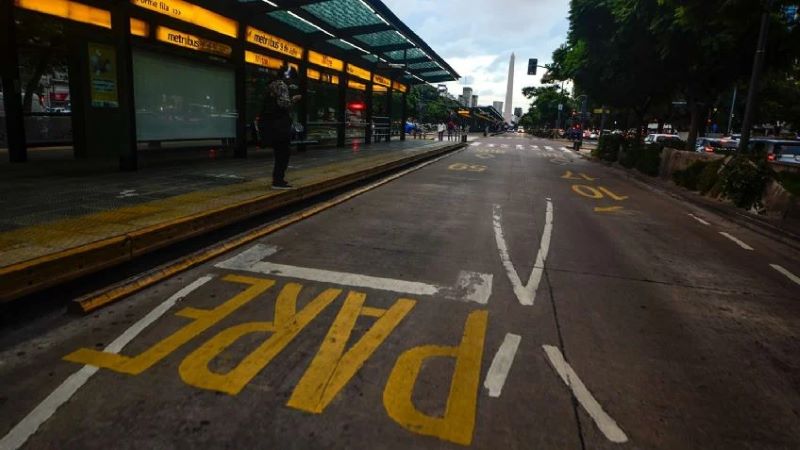
The transport strike, the May 9 strike and contentious Argentina. Editorial of “El Círculo Rojo”, a program on La Izquierda Diario that broadcasts on Thursdays from 10 p.m. to midnight on Radio Con Vos, 89.9.
- Once the great historian Tulio Halperin Donghi was asked what the attitude of Argentine society had been towards the dictatorship and he responded: “Valentine Alsina already said it when he went into exile… From the ship he shouted: ‘Goodbye, Italian people’, but Italian meant changing, fickle people, etc. And it is evident that Argentine society is one of the most changing in that sense. He has – I would say – * messes that end suddenly.” These statements were recovered by a book that came out last year titled Tulio Halperín Donghi. The inheritance is there. Ten commented interviews, compiled by Javier Trímboli and published by the omnivora publishing house.
- A couple of decades later, shortly after Javier Milei took office, in an interview for the newspaper La Nación, they asked Pablo Gerchunoff (also a historian, specialized in the economy, but with a more general view), which other president would Milei resembles and what other historical and economic moment does the current context resemble? And Gerchunoff responded that what was new was Milei’s attempt to make an adjustment of this type while being a parliamentary minority: “In a democratic experience, we have never seen an attempt at stabilization with such a parliamentary minority.” Gerchunoff said that the society that had just voted for Milei was “a tired society, like two heavyweight boxers in the 15th round, hugging because they can’t give it any more, looking at the clock to see if the fight is over. I see society more in that way than in one of going into combat. If what I say is true, that gives Milei an advantage, but he has to take advantage of it. He has to know that that boxer is going to recover. That Argentine society is a rebellious, plebeian, annoying, egalitarian society. You are not going to lose all those traits. They may be numb at some point, but you are not going to lose them.”
- They are essayistic, metaphorical, almost literary definitions, but they come, I believe, from a deep observation of the national tradition that has its own characteristics that respond to its conditions and its history.
- They seem to me to be characteristics confirmed by reality. And today, both we and essentially the government of Javier Milei had a “free sample.”
- The massive bus strike in the Metropolitan Area of Buenos Aires concentrated a series of contradictions that cross the Government, combined with these latent characteristics.
- On the one hand, a Government that intends to maintain the “lie”, the “fiction” of the drastic reduction of the fiscal deficit and therefore cannot give up those subsidies claimed by companies so that they can comply with the parity agreements because it would affect that adjustment; On the other hand, it cannot authorize a high rate like the one demanded by businessmen as an alternative to subsidies because (along with the rest of the increases that are beginning to arrive) it would push inflation up and collapse another of the alleged “achievements” drawn by government. At the same time, it needs to not standardize salary agreements (as also happens with Truckers, where another conflict may break out) because the Government says that it does not intervene in the formation of any price, it let all of them skyrocket, except one: the price of force. of work that must be capped. Finally, entrepreneurs who always want to win. Today the Transportation “authority” said that it was going to sanction them, but not long ago in one of its presentations, Milei said that the businessmen were “social benefactors.” Look what the “benefactors” of transportation are capable of doing with millions of people just to defend their profits.
- This series of contradictions exploded at one point and, in fact, opened a major crisis with a measure of forceful force in almost all lines of the AMBA, which played some role in the decision made by the CGT to call a national strike for the May 9, in addition to participation in the university march and a mobilization on May 1.
- Be careful, it was the most shocking conflict, but not the only one. We had a fairly strong teaching strike a few days ago, today the workers of Acindar Villa Constitución carried out an important mobilization for the salary situation and against layoffs; Something similar is open at Pepsico in Mar del Plata also due to layoffs, in combination with a renewed activity that we are witnessing in the university community, not only at the UBA or in La Plata, but in several provinces.
- This characteristic, this distinctive feature of Argentine society, is what is generally lost sight of by those who superficially look at quantitative surveys and quickly draw the conclusion that “the Government maintains support, therefore, it has a license for everything.” Let’s do an exercise, let’s ask ourselves how many drivers may have answered in a survey that an adjustment was necessary, cutting expenses, etc., when asked “in general” and, perhaps, many of those same drivers came out today – legitimately – to defend themselves when asked. touched in particular. Well, in a society with the union organization that Argentina maintains (with all the problems that bureaucratic unions have) and with other very diverse forms of organization, reading everything only through surveys leads to a biased perception. Furthermore, something that caught our attention was that many people consulted on the street, in Constitución or Once, not only did not condemn the strike, but they supported it, because, obviously, they live in Argentina where their income is also being liquidated. .
- This happens from below, while above we witness the multiple internal conflicts not only between the coalitions in general, but within the Government itself. The highest grossing was the one that ended in the displacement of the head of the libertarian bench in Deputies, Oscar Zago, due to the appointment of the presidency of the impeachment commission, but perhaps the most important is the “larved” internal situation that the minister faces. of Economy, Luis “Toto” Caputo, because everyone is beginning to notice the precariousness of the results in the economy. In fact Milei is shown with another team, led by Demian Reidel with whom Milei (according to what she told Fantino) discusses more in-depth issues, while with Caputo only day to day.
- What relationship do one thing have and the other? Well, ultimately, the internal ones or this more “minimalist” stage (as Jorge Liotti called it right here), “minimalist” in the sense of negotiating in parts, with different actors (even if it turns out badly), is a recognition of the more general relationship of forces that begins to become evident also below.
- Maybe the UTA leadership is going to do everything possible to negotiate, maybe the CGT wants a strike to decompress (while negotiating other things), that will be to follow and discuss, but I think the important thing today is to highlight that, beyond the successist self-narrative of the Government, there is a country with more than enough capacity to confront it.
Photo: Juan Mateo Aberastain/MDZ
Politics / UTA / CGT / Javier Milei
Source: www.laizquierdadiario.com

